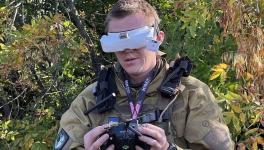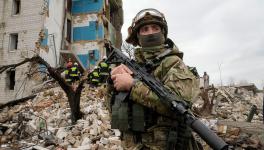The Fog of War in Syria Deepens
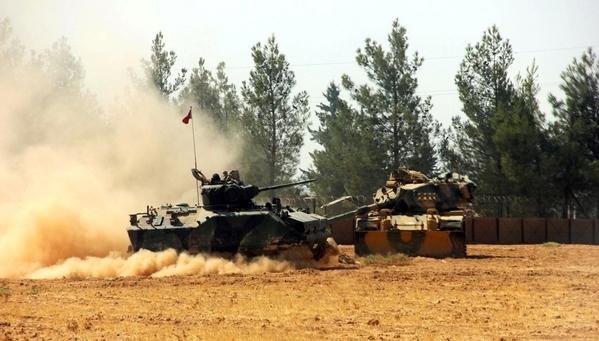
A Turkish army tank and an armoured vehicle are stationed near the Turkish-Syrian border in Karkamis in the southeastern Gaziantep province (AFP). Image Courtesy: middleeasteye.net
Turkey's invasion of Syria to capture Jarabulus on the Syrian border and the recent Hasakah clashes in north-east Syria between the government and the Kurdish sides, have the potential of dramatically changing the correlation of forces in Syria. The entry of Turkey into Syria could not have happened without some understanding between Syria, Turkey and Russia. Will this understanding extend to Aleppo, the second largest city in Syria, where a bitter battle is going on currently? Will Turkey now stop its support of al Nusra, the al Qaeda affiliate in Syria? Or is Jarabulus a limited understanding between Turkey and Syria that will not change the larger alignments in Syria? With the US supporting the Turkish invasion and asking Kurds retreat to the east of River Euphrates, will the Kurds feel betrayed? The fogs of war have to clear further before we can reach a judgment on these questions.
Jarabulus and Hasakah
A few days back, the Turkish tanks, its army units and Turkey supported rebels, in an operation called Operation Euphrates Shield, captured Jarabulus. While the Turkish government claimed that they had taken over Jarabulus after defeating the ISIS forces, ISIS does not appear to have offered any resistance: they were quite “happy” to hand over Jarabulus to Turkey. Turkey's main interest has been to prevent Jarabulus falling into the hands of Kurdish forces. Turkey's argument of shutting off ISIS supply lines into Syria carry little conviction, as Turkey could have sealed the border from the Turkish side, and without entering Syria.
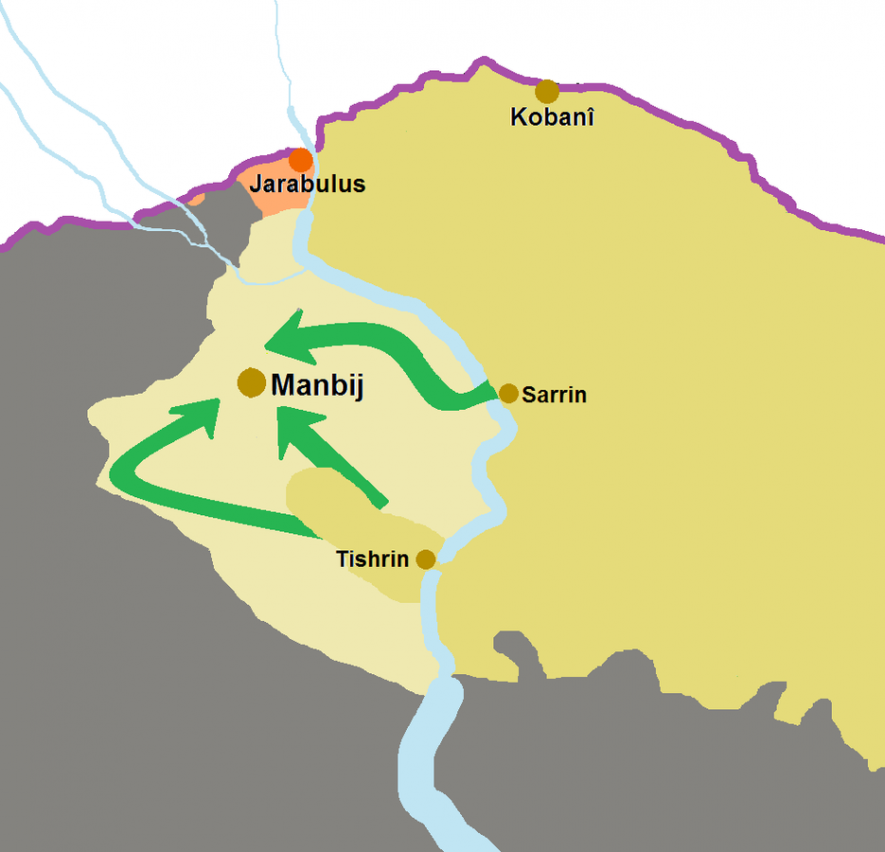
Courtesy: Wikimedia
The Turkish government now wants the Kurdish forces to retreat beyond the River Euphrates, and give up to Turkey all the area they have recently captured from ISIS including Manbij town on the west bank of Euphrates and a little to the south of Jarabulus. Joining with the Turkish demand, the US Vice President Joe Biden has demanded that the Kurds – YPG and its Arab allies, the SDF -- immediately withdraw to the east of River Euphrates. Otherwise they would lose US support.
There are mixed reports whether Kurds have indeed withdrawn from Manbij or are still deployed in the area.
Meanwhile, the Hasakah sector in the north east of Syria has also hotted up with clashes between YPG/SDF and the Syrian government forces. There are now conflicting reports on whether a ceasefire has taken place between the two sides, or whether the clashes still continue.
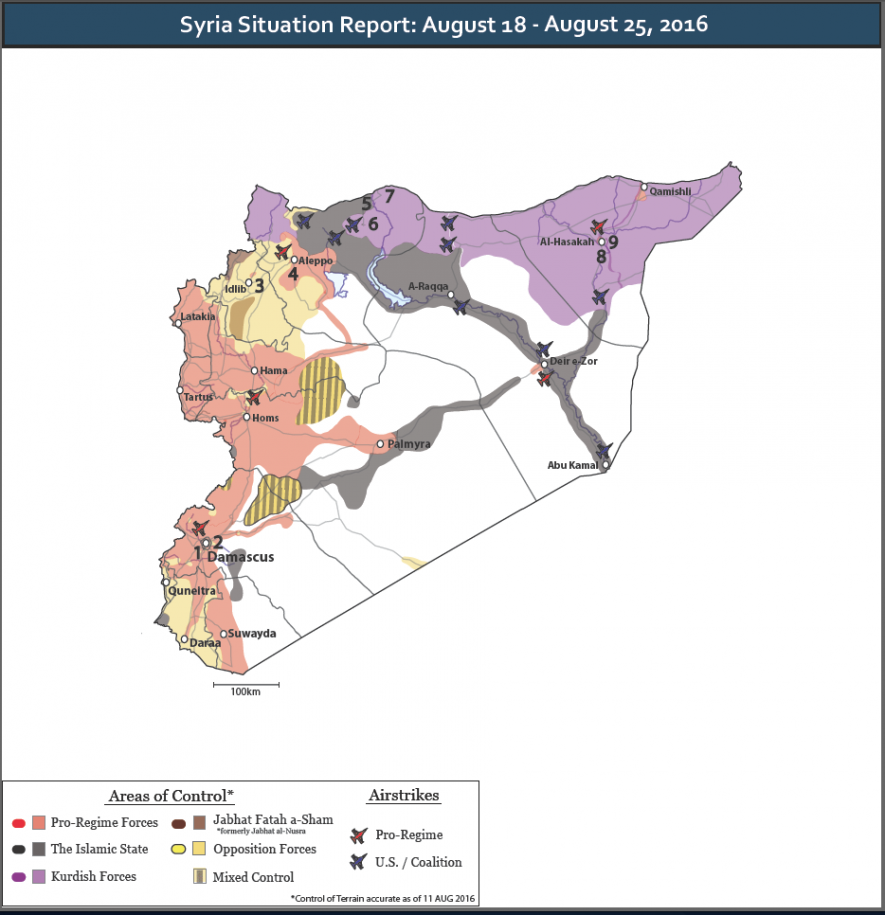
Till now, the Kurdish forces and the Syrian government have maintained a kind of armed coexistence. Though they were not allies, they still refrained from attacking each other. When occasional clashes occurred, they were quickly tamped down by both sides. The Hasakah clashes are ominous, as they can lead to multisided battles in which both – the government forces, and Kurds and their allies – will be losers.
So what has changed in the last few days? Why has Turkey entered Syria, something they have avoided till now? Why has Syria and Russia's criticism of Turkey been much more muted than they would have been a few months ago? What has emboldened the Kurds to try and take on the Syrian government in Hasakah, after having carefully avoided such an engagement till now?
One reading of the situation is that the Syrian government did not want the Kobane area to join with Afrin, the two cantons under Kurdish control, and create a continuous zone in northern Syria under Kurdish control. Therefore, their interests coincided with the Turks, who would also be very unhappy to see such an outcome.
The Hasakah clashes also alienated Syria from the Kurds. Without tacit Syrian consent, Turkey would have been afraid of the Russians entering the fray, and therefore a war with Russia. Serious backchannel negotiations appear to have occurred before the Turks entering Jarabulus.
The Hasakah clashes could be quite dangerous for both the Kurds and the Syrian government. The Kurds seemed to have been egged on by the US, who were providing them with air cover and other logistical support to try and expand their sway in north eastern Syria. Even with such US “encouragement”, it appears to be a miscalculation on the part of the Kurdish forces to take on the Syrian government forces. It is also against the spirit of earlier Kurdish proposals of a federated Syria. Syria could now join all the other governments in the area – Turkey, Iran and Iraq – in opposing the emergence of a Kurdish state or a Kurdish autonomous region.
While the US has been supporting the Kurdish forces with air and even ground support, its sudden demand asking the Kurds to get back to the east of Euphrates, is a major shift. The recent attempted coup in Turkey and the Turkish charge that the CIA had played a role in the coup attempt, have strained the relations between the US and Turkey. The US seems to have decided that Turkey, its close NATO ally, was in immediate danger of breaking free of its sphere of influence. If the Kurds needed to be thrown under the bus to make Turkey happy, so be it.
The Battle of Aleppo
Simultaneously, the battle for Aleppo is entering a critical phase. The war waged by the “united front” of Islamist sectarian forces of al Qaeda, and “moderate” forces backed by the west against the Syrian government and its allies, is being fought most bitterly in South West Aleppo. Both sides have suffered heavy losses.
Initially, the Syrian government forces, supported by the Russians, Iranians and the Hezbollah, were able to encircle West Aleppo, which is under the control of Jabahat al Nusra, the Syrian affiliate of al Qaeda. In a counter attack, the al Nusra, along with its “moderate” allies have broken through in the south-west sector of Aleppo, where major battles are going on currently.
Earlier, when it appeared that the so-called “moderate” forces or al Qaeda lite were on the brink of defeat, the western powers had actively promoted a ceasefire. Kerry, the US Foreign Secretary had tried very hard to include the al Nusra in the ceasefire, arguing that “moderate” and al Nusra forces were difficult to separate. The reality is that the western powers, Saudi, other Gulf Monarchies, Turkey, Israel and al Nusra, are all a part of a grand alliance against the Bashar al Assad government.
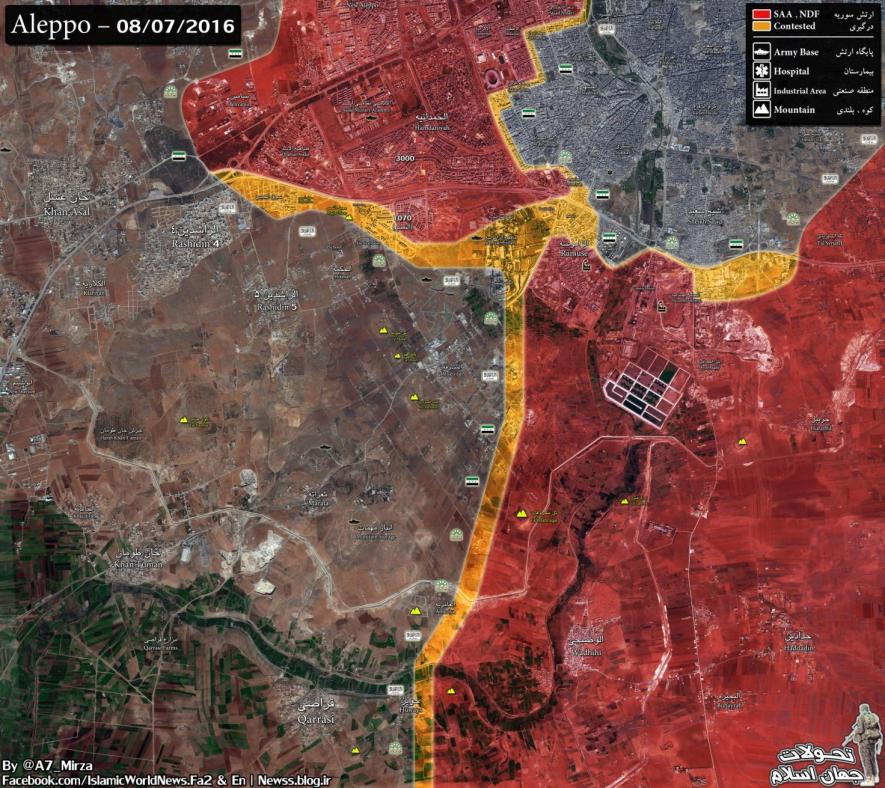
The US and its allies had taken advantage of the temporary ceasefire to arm the rebel forces. It is widely accepted that any supplies given to the “moderate” rebels end up with al Nusra and ISIS. It now appears that MANPADS – Man-portable-air-defence-systems – have also been supplied to the rebels, making it difficult for the Russians and Syrians to use attack helicopters in support of the ground troops. Consequently, the Russians have been bombing from 25,000 to 30,000 feet and beyond the range of the MANPADS. With this, there is a greater chance of civilian casualties; it also make the air strikes less effective.
It is unlikely that Aleppo will fall to the rebels. However, even if the government forces win in Aleppo, they and their Iranian and Hezbollah allies lack the ground strength to end the Syrian war quickly. As long as the western powers and its regional allies are willing to supply the rebels with lethal arms and weapons, and there is a steady supply of foreign fighters coming through Turkey, the war in Syria will continue.
Only a change of sides by a major player can bring this war to a quick end. This could be either Turkey coming closer to Syria or Russia; or the US realising that playing with sectarian Islamist “fire” will singe them as well.
Disclaimer: The views expressed here are the author's personal views, and do not necessarily represent the views of Newsclick
Get the latest reports & analysis with people's perspective on Protests, movements & deep analytical videos, discussions of the current affairs in your Telegram app. Subscribe to NewsClick's Telegram channel & get Real-Time updates on stories, as they get published on our website.













